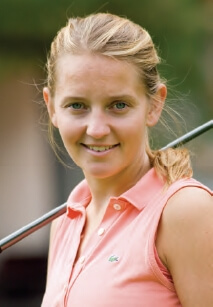News
A second after her cap dusted the ground at the University Colorado at Boulder, the Swedish-born Maria Persson Gulda grabbed her clubs to join the ranks of professional golfers. Prior to her arrival at Harvard to pursue a Ph.D. in applied physics, she was on courses, not taking them.
Her journey began thanks to happenstance. Her parents (who do not play) lived a few steps from one of Sweden’s most famed greens, the Halmstad Golf Club. At 10 Gulda took up the sport---and discovered that her love of the game was equal to her talent. She then set her sites on the U.S. for college because of the increased opportunities to combine academics with athletics.
“I was actually just going to come over the U.S. for a year to learn English and to see a lot of the country,” she says. But, a coach at CU Boulder took an interest in her game and her grades (Gulda earned a 3.911 GPA in engineering physics even while playing more than 20 hours a week) and suggested that she consider going pro.
During her first (and only) summer among the professionals, she did not make the cut for the major LGPA tournaments; she did, however, come close, landing in near the top 30 during her second try. To put this in perspective, it normally takes about five years of trying to break into the majors.
As a pro, Gulda watched the girls whose entire lives were spent sun-up to sun-down golfing, with personal trainers, coaches, families and partners all like a kite’s tail in tow. Moreover, she says that “until you make it to those years when you can support yourself” life is composed of composed of non-stop practice, play, and plane rides.
“I have so many passions for other things that I want to fit in my life,” she says about her decision to leave the links for the lab. Entering graduate school does not mean that Gulda plans to give up playing golf. She’s even found a way to relate her sporty side with her academic one. “You get a feeling in your body before you hit a ball that this is going to be a great shot. It is a flow that you get. That can be the same thing with problem sets. Some days you really feel this is a great day of doing homework. You see everything: it is just there.”
Cutting-edge science delivered direct to your inbox.
Join the Harvard SEAS mailing list.

